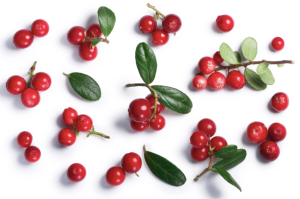
The cranberry (Vaccinim V.I) is a small subshrub, cousin of the blueberry and the cranberry. It develops on degraded soils, often peaty, in the form of strongly rooted and branched patches. It is a perennial, evergreen species, common in the mountains.
Cardiovascular and urogenital system
Lingonberry is a predominantly female oriented herb that acts as a remedy for premature aging in the many stages of biological decomposition. It is particularly recommended in menopause because of its estrogen-like action, as an antispasmodic, in hot flashes. In post-menopause, it can be taken regularly to prevent uterine fibroids and, as Dr Pol Henry indicates, it helps preserve a woman’s youth.
Joint system
It facilitates the assimilation of calcium and therefore is useful in osteoporosis. It is a good supplement against chronic progressive polyarthritis.
Urinary system
It is an effective urinary disinfectant. It effectively unclogs the kidney glomeruli, eliminates kidney stones (oxalocalcium lithiasis), acts on nephritis and on the prostate. Lingonberry is an effective diuretic and bladder drainer, particularly in recurrent cystitis.
Circulatory and pulmonary system
Lingonberry acts on the arteries and arterioles, preventing sclerosis and degeneration of the wall, in particular as a protector of the endothelium. It helps eliminate uric acid, urea and cholesterol. At the pulmonary level, it acts on pulmonary fibrosis, the consequences of old pulmonary embolism.
Digestive system
At the digestive level, Vaccinum V.I bud macerate is recommended for chronic constipation, spasmodic colitis (regulatory action on the motility of the colon, diarrhea (especially post-antibiotic, it constitutes a remarkable drainer and intestinal decontaminant). In summary, this macerate is a versatile, anti-aging remedy recommended for elderly people, particularly women whose youth it preserves.




Leave a Reply